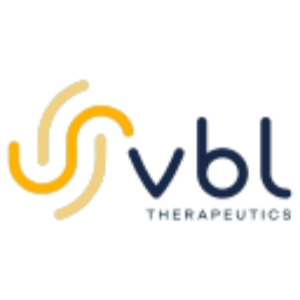VBL Presents Human Proof-of-Concept Data That Show the Potential of its Novel anti-MOSPD2 Monoclonal Antibodies for Multiple Sclerosis at the MS Virtual 2020 Meeting
Rhea-AI Summary
VBL Therapeutics (Nasdaq: VBLT) revealed new ex-vivo data from its anti-MOSPD2 monoclonal antibodies for treating multiple sclerosis (MS). Presented at the MS Virtual 2020 conference, the study involved 33 patients, showing a remarkable 97% inhibition of monocyte migration, irrespective of disease severity or treatment. The company's lead candidate, VB-601, is advancing through IND-enabling studies with a first-in-human trial anticipated in the second half of 2021. These findings underscore the potential of VBL's proprietary MOSPD2-targeting approach in MS treatment.
Positive
- 97% inhibition of monocyte migration in MS patients across different disease types.
- Participation in MS Virtual 2020 conference enhances visibility.
- Lead candidate VB-601 progressing towards first-in-human studies.
Negative
- Potential risks associated with clinical trials and regulatory approvals.
News Market Reaction 1 Alert
On the day this news was published, VBLT gained 18.42%, reflecting a significant positive market reaction.
Data tracked by StockTitan Argus on the day of publication.
TEL AVIV, Israel, Sept. 11, 2020 (GLOBE NEWSWIRE) -- VBL Therapeutics (Nasdaq: VBLT), today presents for the first time new data demonstrating ex-vivo activity of its proprietary investigational anti-MOSPD2 mAbs in patients with relapsing-remitting and progressive multiple sclerosis (MS). VBL's study is being presented at the MS Virtual 2020, the virtual 8th Joint ACTRIMS-ECTRIMS Meeting.
Data show that VBL's anti-MOSPD2 mAbs significantly inhibited migration of monocytes isolated from all MS patients included in the study (n=33) by up to
“We believe our antibodies open up a completely novel mechanism for potential treatment of MS, through blocking the accumulation of monocytes/macrophages in the central nervous system,” said Itzhak Mendel, Ph.D., Immunology Director of VBL Therapeutics. “This mechanism is differentiated from the existing available treatments, which mostly target T and B cells and therefore, it is not surprising that our antibodies showed activity on top of any patient active therapy. Backed up by strong preclinical results, these first patient-driven proof-of-concept data reinforce the therapeutic potential of our MOSPD2 program.”
VBL is currently advancing lead anti-MOSPD2 candidate VB-601 through IND-enabling studies, aiming to start a first-in-human study in 2H 2021.
For a link to VBL's presentation at the MS Virtual 2020 conference, see: LINK
About VBL's VB-600 Platform
VBL is conducting two parallel drug development programs that are exploring the potential of MOSPD2 (motile sperm domain-containing protein 2), a protein that VBL has identified as a key regulator of cell motility, as a therapeutic target for inflammatory diseases and cancer. Our VB-600 platform comprises classical anti-MOSPD2 monoclonal antibodies for inflammatory indications, as well as bi-specific antibody candidates for oncology.
About VBL
Vascular Biogenics Ltd., operating as VBL Therapeutics, is a clinical stage biopharmaceutical company focused on the discovery, development and commercialization of first-in-class treatments for areas of unmet need in cancer and immune/inflammatory indications. VBL has developed three platform technologies: a gene-therapy based technology for targeting newly formed blood vessels with focus on cancer, an antibody-based technology targeting MOSPD2 for anti-inflammatory and immuno-oncology applications, and the Lecinoxoids, a family of small-molecules for immune-related indications. VBL’s lead oncology product candidate, ofranergene obadenovec (VB-111), is a first-in-class, targeted anti-cancer gene-therapy agent that is being developed to treat a wide range of solid tumors. It is conveniently administered as an IV infusion once every 6-8 weeks. It has been observed to be well-tolerated in >300 cancer patients and demonstrated activity signals in a VBL-sponsored “all comers” Phase 1 trial as well as in three VBL-sponsored tumor-specific Phase 2 studies. Ofranergene obadenovec is currently being studied in a VBL-sponsored Phase 3 potential registration trial for platinum-resistant ovarian cancer.
Forward Looking Statements
This press release contains forward-looking statements. All statements other than statements of historical fact are forward-looking statements, which are often indicated by terms such as “anticipate,” “believe,” “could,” “estimate,” “expect,” “goal,” “intend,” “look forward to,” “may,” “plan,” “potential,” “predict,” “project,” “should,” “will,” “would” and similar expressions. These forward-looking statements may include, but are not limited to, statements regarding our programs, including MOSPD2, including their clinical development, therapeutic potential and clinical results. These forward-looking statements are not promises or guarantees and involve substantial risks and uncertainties. Among the factors that could cause actual results to differ materially from those described or projected herein include uncertainties associated generally with research and development, clinical trials and related regulatory reviews and approvals, the risk that historical clinical trial results may not be predictive of future trial results, the impact of the COVID-19 pandemic on our business, operations, clinical trials, supply chain, strategy, goals and anticipated timelines and clinical results, that our financial resources do not last for as long as anticipated, and that we may not realize the expected benefits of our intellectual property protection. A further list and description of these risks, uncertainties and other risks can be found in our regulatory filings with the U.S. Securities and Exchange Commission, including in our annual report on Form 20-F for the year ended December 31, 2019, and subsequent filings with the SEC. Existing and prospective investors are cautioned not to place undue reliance on these forward-looking statements, which speak only as of the date hereof. VBL Therapeutics undertakes no obligation to update or revise the information contained in this press release, whether as a result of new information, future events or circumstances or otherwise.
INVESTOR CONTACT:
Michael Rice
LifeSci Advisors, LLC
(646) 597-6979









